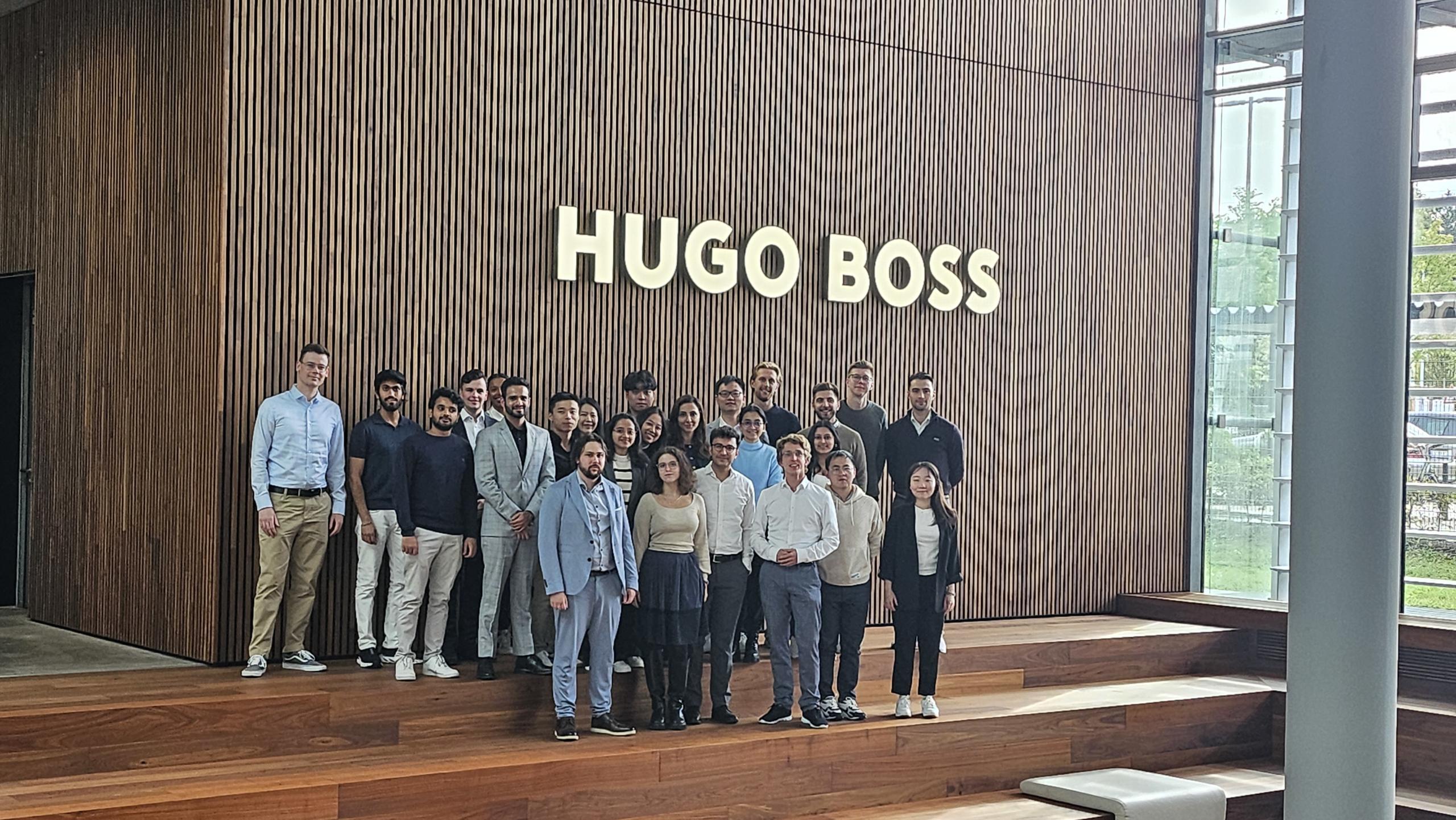"jcr:7baa7335-880e-4e87-a553-bcbb78c1e46f" (String)
Wählen Sie Ihre Sprache
Master of Artificial Intelligence & Data Science

120 ECTS
*zzgl. 400 EUR Einschreibegebühr und 100 EUR Bewerbungsgebühr
Unser Master of Artificial Intelligence & Data Science ist für Absolventen mit starken mathematischen Fähigkeiten konzipiert und bereitet sie darauf vor, in den dynamischen Bereichen der KI und Datenwissenschaft erfolgreich tätig zu sein. Das Programm baut auf quantitativen Grundlagen auf und vermittelt ihnen ein umfassendes Verständnis der Datenwissenschaft, um berufliche Herausforderungen zu bewältigen.
Durch das einzigartige Curriculum, das KI, maschinelles Lernen, Datenwissenschaft, Wirtschaft und Finanzen verbindet, erhalten die Studierenden eine breitgefächerte Ausbildung, die den aktuellen Anforderungen der Geschäftswelt gerecht wird. Das 3-Tage-Modell ermöglicht es, neben dem Studium in Teilzeit zu arbeiten und praktische Erfahrungen zu sammeln.
Die Studierenden arbeiten an Industrieprojekten mit führenden Unternehmen und Start-ups und gewinnen dadurch praktische Erfahrung. Sie werden von renommierten Dozenten betreut und erhalten Zugang zum Entrepreneurship Accelerator oder Inkubator, um eigenen Projekte zu entwickeln. Das Programm behandelt darüber hinaus ethische und rechtliche Aspekte der KI und befähigt die Studierenden, sich in der vierten industriellen Revolution zurechtzufinden.
Rankings & Akkreditierungen

Die Frankfurt School zählt zu den besten europäischen Business Schools. Sie ist von AACSB, EQUIS und AMBA akkreditiert, den drei führenden internationalen Akkreditierungsorganisationen für Business Schools. Damit gehört die Frankfurt School zu den wenigen Institutionen weltweit, die mit der sogenannten "Triple Crown" ausgezeichnet wurden.
Unser Master of Artificial Intelligence & Data Science basiert auf vier Säulen, die eine umfassende und zusammenhängende Bildungsreise ermöglichen.
-
Technological Mastery:
Die erste Säule vertieft das theoretische und technologische Fundament der Datenwissenschaft und Künstlichen Intelligenz. Hierbei werden wesentliche Bereiche wie Algorithmen und Datenstrukturen, computationale Statistik, maschinelles Lernen, Deep Learning und Cloud Computing abgedeckt. Diese Module legen das Fundament für technische Kompetenz.
-
Business Process Integration:
Die zweite Säule konzentriert sich auf die enge Verzahnung von Datenwissenschaft und Geschäftsprozessen. Sie verdeutlicht, wie datengestützte Einblicke bessere Geschäftsabläufe und Entscheidungsprozesse fördern.
-
Ethical and Legal Awareness:
Die dritte Säule bietet eine kritische Auseinandersetzung mit den ethischen und rechtlichen Aspekten von Data Science und KI. Sie bereitet die Studierenden darauf vor, die moralischen Herausforderungen und Risiken der statistischen Technologien zu bewältigen.
-
Practical Business Applications:
Die vierte Säule legt den Schwerpunkt auf die praktische Anwendung von Data Science und KI in der Geschäftswelt. Sie befähigt die Studierenden, ihr Wissen in umsetzbare Lösungen zu übersetzen, die Innovation und Wachstum im Unternehmen fördern.
★ Kostenlose Vorkurse in Python und Mathematik werden im August vor Studienstart angeboten.
Quantitative Fundamentals
Students will acquire a rudimentary understanding of linear algebra, probability theory, information theory and their use in machine learning and data science. Paying particular attention to mathematics for information systems, this module serves as a foundation module for Machine Learning 1 & 2.
Lecturer
Algorithms & Data Structures
Using Python, this module provides you with an introduction to basic algorithms, as well as the design analysis of algorithms and data matching structures. This allows you to implement taught algorithms and learn the basics of Python.
Lecturer
Introduction to Data Analytics
Data Analytics plays an important role in both industrial projects and academic research. It encompasses methodologies, algorithms, and processes aimed at providing insights into high-dimensional datasets. While classical statistical approaches may not be applicable in this context, novel data-analysis techniques have emerged within the realm of machine learning. These methods are now widely used in both scientific research and practical applications, leveraging the computational power offered by modern computer technologies.
This module serves as an introduction to Data Analytics, focusing on computational techniques and algorithms designed to discover and analyze patterns, even within large-scale datasets. Covered topics include data analysis, visualization, segmentation, classification, prediction, and decision-making. You will have the opportunity to implement and apply these methods using the Python programming language and related libraries.
---
Lecturer
Computational Statistics & Probability
This course introduces causal inference and generalised linear multilevel models from a Bayesian perspective. The aim of the course is to give you a hands-on introduction to the fundamentals of statistical modeling. We will cover the basics of regression up to advanced multilevel models, focusing on the algorithmic details throughout the course to build your understanding of and confidence with model-based computational statistics.
Lecturer
The Language of Business
This module serves as introduction to accounting as the language of business and its various purposes and applications. On a very fundamental level, accounting statements are a primary source of systematic public information about businesses, providing the basis for answering many relevant questions. As such, it is important for those interested in business data analytics.
Lecturer
Databases & Cloud Infrastructure
Nowadays everyone is aware of the ever-growing importance of the data streams fueling the economy and becoming the future catalyst for our society. Learn how to master these streams by understanding the key concepts of the most important frameworks and technologies for data storage and management.
External Lecturers
Prof. Dr. Peter Roßbach & Dr. Jörg Gottschlich
UPDATED* Machine Learning I
*This module is refreshed for 2026 intake to meet the demands of today’s rapidly evolving artificial intelligence and production machine learning landscape.
This module gives you hands-on experience with core supervised learning techniques to build predictive models from data. You’ll master foundational algorithms, dive into neural networks, and get introduced to transformer architectures. Plus, explore a teaser on Reinforcement Learning with Human Feedback (RLHF) to see the future of AI training.
Lecturer
Guided Studies in Financial Management
The course provides an introduction to financial management, including capital budgeting and capital markets. The main focus is on designing and conducting empirical analyses in small teams.
External Lecturer
Dr. Stefan Scharnowski
UPDATED* Machine Learning II
*This module is refreshed for 2026 intake to meet the demands of today’s rapidly evolving artificial intelligence and production machine learning landscape.
This hands-on module serves as the primary course on unsupervised learning within statistical machine learning and probabilistic data analysis, focusing on highly parameterized models. Core topics include clustering, density estimation, dimensionality reduction, and the Expectation-Maximization (EM) algorithm. Advanced methods such as auto-encoders and contrastive learning are also covered. Additionally, you will explore reinforcement learning fundamentals, including bandits and policy gradient techniques. Throughout, you will implement both supervised and unsupervised models while addressing the computational challenges of statistical inference on high-dimensional data.
Lecturer
AI & Humanity: The Ethics of Data Science
This module explores the ethical and legal questions that information technologies raise for issues such as privacy, responsibility or fairness. Participants will gain an in-depth comprehension of legal and ethical issues surrounding information technologies, as well as the crucial legal and ethical questions that we should ask about such technologies. On successful completion of this module, students will have developed and strengthened their analytic and critical skills, as well as their ability to apply those skills to ethical and legal problems and develop solutions to those problems.
Lecturer
Strategy and Performance Management
This module gives you the latest insights into strategy development and execution with a strong emphasis on organisational and machine learning on data analytics. Students become acquainted with models, tools and techniques to develop, analyse and execute organisational strategy and its success.
Lecturer
NEW* Generative AI and Agentic Systems
*NEW MODULE FOR INTAKE 2026
This course teaches students how to design and manage advanced LLM systems by combining generative models with structured control. Key topics include transformer fundamentals, LLM compute patterns, agentic frameworks like ReAct and Planner-Executor, and control logic through hooks, guardrails, and schema validation. Students will explore RAG 2.0 with hybrid retrieval, routing graphs, and memory structures, as well as build coding assistant workflows using IDE plugins and secure CLIs. The course also covers evaluation through tracing and dashboards, along with safety practices such as red-teaming, audits, and policy enforcement.
Lecturer
NEW* Machine Learning Operations
*NEW MODULE FOR INTAKE 2026
This advanced course trains students to deploy, monitor, and maintain ML and generative AI systems in production. Building on Generative AI and Agentic Systems, it covers transforming prototypes into scalable services while addressing the unique challenges of operating modern AI at scale. Core topics include environment and pipeline reproducibility (Conda, Docker, DVC, MLflow), CI/CD and automated testing, containerized deployment and serving (TorchServe, TGI, vLLM), inference optimization (quantization, batching, GPU management), and robust monitoring (latency, drift detection, cost tracking, incident response). Students gain practical skills to build efficient, reliable, and cost-effective AI infrastructure.
Senior Lecturer
Company Cooperation Project
This module is a practical project conducted with a partner company which allows students to apply the skills they have learned during other semesters. Students will work in groups of 3-4 on small, current data science projects within the company under the supervision of a professor and company representative. Students will learn how to illustrate and decompose business problems as well as cleaning and managing data at all stages and then applying data science and machine learning to create a service or software for the project.
Lecturer
Electives or Entrepreneurship or Study Abroad
A range of electives allows you to tailor your Master in Applied Data Science through a diverse and distinctive structure of time formats. Electives are taught not only by in-house faculty but also by leading international practitioners, providing you with the tools to meet your personal aspirations. Elective options are published during the third semester and students must choose elective modules to start in their last semester.
Students have the opportunity to replace their elective modules with either a semester abroad at one of our international partner universities or take part in our Entrepreneurship module.
Master Thesis
You are required to conduct independent research in order to complete your Master's thesis. You will review relevant scientific publications and acquire an in-depth knowledge in the respective field before applying research methods and writing concepts to structure your work. The thesis period is typically three months and takes place during the 4th semester.
Lernziele
Wissen und Verständnis
Absolventen wird fundiertes Wissen und ein kritisches Verständnis der zentralen Theorien, Prinzipien und Methoden der Datenwissenschaft vermittelt. Sie sind in der Lage, komplexe Datenprobleme zu identifizieren, zu analysieren und zu bewerten.
Diese Kompetenz wird insbesondere in den Kernmodulen entwickelt, wie Algorithmen und Datenstrukturen, Einführung in die Datenanalyse im Business oder Computationale Statistik und Wahrscheinlichkeit sowie durch verschiedene Lehr-, Lern- und Bewertungsmethoden (z. B. Projekte, Programmieraufgaben oder Prüfungen).
Anwendung und Entwicklung von Wissen
Absolventen werden in der Lage sein, rechnergestützte, datengetriebene Modelle zu entwickeln und kritisch zu bewerten, um komplexe Datenprobleme im geschäftlichen Kontext zu lösen.
Die Anwendung analytischer Techniken ist das Herzstück fast aller Module des Programms. Der Master in Applied Data Science fördert nicht nur das Erlernen von Modellen, sondern auch deren Anwendung im Unterricht (z. B. Maschinelles Lernen I und II oder Deep Learning).
Kommunikation und Zusammenarbeit
Absolventen werden in der Lage sein, effektiv in akademischen und/oder geschäftlichen Kontexten zu kommunizieren. Sie können technische Problemlösungen formulieren und diese im Diskurs vertreten. Sie sind verantwortungsbewusste Teammitglieder, die unterschiedliche Perspektiven berücksichtigen und reflektieren.
Diese Kompetenzen werden in vielen Modulen, wie der Einführung in die Datenanalyse im Business oder den Geführten Studien im Finanzmanagement, praktiziert, bei denen die Studierenden mehrere Wochenprojekte absolvieren, um das erworbene Wissen und die Fähigkeiten anzuwenden. Diese Kompetenz steht zudem im Mittelpunkt des Kooperationsprojekts mit Unternehmen. Hier testen unsere Studierenden das in den vorherigen Semestern erlernte Wissen, indem sie an realen Business-Fällen führender Unternehmen arbeiten. Über einen Zeitraum von ca. zwei Monaten arbeiten sie eng mit dem Unternehmen zusammen, wodurch sie praxisnahe, berufliche und persönliche Erfahrungen sammeln.
Wissenschaftliches Selbstverständnis und Professionalität
Absolventen sind erfahrene Kooperationspartner in Geschäftsumfeldern. Sie haben ein tiefes Verständnis ihrer ethischen und rechtlichen Verantwortung als angewandte Datenwissenschaftler und stützen ihre beruflichen Aktivitäten auf theoretisches und methodisches Wissen.
Die Entwicklung dieser Kompetenzen erfolgt über den gesamten Lehrplan hinweg und spiegelt den natürlichen Lernweg der Studierenden wider, während sie akademisch und beruflich wachsen. Der Höhepunkt des individuellen Bewusstseins der Studierenden für ihre Rolle in Wirtschaft und Gesellschaft zeigt sich im Abschlussprojekt, der Masterarbeit, und im Kernmodul "KI & Menschheit – Die Ethik der Datenwissenschaft". Nach erfolgreichem Abschluss dieses Moduls verfügen die Studierenden über ein tiefes Verständnis der zentralen rechtlichen und ethischen Fragen im Zusammenhang mit Informationstechnologien und können ethische und rechtliche Probleme identifizieren, angemessene Lösungen entwickeln und ihre eigene Bewertung kritisch hinterfragen.
Kooperationsprojekt mit Unternehmen
Im 3. Semester haben die Studierenden die Möglichkeit, das in den vorherigen Semestern erworbene Wissen in der Praxis anzuwenden, indem sie an realen Business-Cases gemeinsam mit führenden Unternehmen arbeiten. Über einen Zeitraum von 3-4 Monaten arbeiten sie eng mit dem Unternehmen zusammen, vom Start bis zum Abschluss des Projekts. Dadurch sammeln sie umfassende, praxisnahe Erfahrungen, die sie optimal auf den Einstieg in den Arbeitsmarkt vorbereiten.
Treffen Sie uns online und auf dem Campus
Erfahren Sie mehr über unsere Master-Programme, indem Sie an einem unserer Master-Informationsabende teilnehmen. Finden Sie das Programm, das am besten zu Ihren Karrierezielen passt.
Nutzen Sie die Gelegenheit, sich bei einem Besuch einer unserer Open Campus Nights ein eigenes Bild von unserem Campus zu machen und sich mit Vertretern der einzelnen Programme auszutauschen.

Personalisieren Sie Ihren Master of Artificial Intelligence & Data Science
3-Tage-Modell
Der Master of Artificial Intelligence & Data Science wird in einem einzigartigen Zeitmodell unterrichtet. Dies ermöglicht es Ihnen, neben Ihrem Vollzeitstudium in Teilzeit zu arbeiten. Wir nennen dies das "3-Tage-Modell". Die Studierenden besuchen in der Regel an drei Tagen pro Woche Vorlesungen – donnerstags, freitags und samstags. Die verbleibenden drei Werktage bleiben Ihnen somit für Selbststudium, Sprachkurse oder eine Teilzeitbeschäftigung.
Entrepreneurship Centre
Die Mission des Entrepreneurship Centre ist es, Frankfurt School-Studierende sowie externe Interessengruppen wie Investoren, Alumni, Gründer und Partner zu inspirieren, zu vernetzen und zu trainieren & fortzubilden. Sie können sich für unseren Inkubator, in dem Sie ganzjährig Unterstützung erhalten oder dem Vorantreiben Ihres Projektes durch die Teilnahme am Accelerator entscheiden. Darüber hinaus können Sie auch das Entrepreneurship-Modul im 4. Semester wählen und diese Spezialisierung zu einem Teil Ihres Studiums machen!
Wahlfächer
Im 4. Semester können die Studierenden aus einer Vielzahl von Wahlfächern wählen, die sich auf Themen wie Finanzen, Management und Datenwissenschaft konzentrieren. Dies gibt ihnen die Möglichkeit, ihr Masterprogramm zu vertiefen und zusätzlich zu den Hauptthemen, Einblicke in andere Interessensgebiete, ausgerichtet auf ihre beruflichen Zielen, zu gewinnen.
Studium im Ausland
Die Frankfurt School hat Partnerschaften mit über 90 Universitäten weltweit aufgebaut, die sich auf Wirtschaft und Management spezialisiert haben. Dieses Netzwerk bietet unseren Studierenden die Möglichkeit, ihre Perspektiven zu erweitern, verschiedene kulturelle und akademische Umgebungen kennen zu lernen und zu erleben sowie internationale Verbindungen auf- und auszubauen. Es ist die Gelegenheit für Sie, in eine neue Umgebung einzutauchen, die Sie auf eine globale Karriere vorbereitet.
Studentenleben
Die Frankfurt School ist stolz auf ihre internationale Studierendengemeinschaft. Viele unserer ambitionierten und inspirierenden Studierenden leiten wichtige Initiativen wie Fundraising für Umweltprojekte oder für Tech- und Innovations-Start-ups und beteiligen sich an Beratungswettbewerben, Sport- und Wohlbefinden-Aktivitäten.
Career Services & Ihr FS-Netzwerk
Nach Abschluss Ihres Master of Artificial Intelligence & Data Science werden Sie in der Lage sein, für Unternehmen die richtigen Verbindungen zu knüpfen. Unternehmen, einschließlich der Big Four, suchen Experten, die spezifische Wünsche und Bedürfnisse verstehen und relevante Lösungen für echte Geschäftstransformationen bieten können. Jobmöglichkeiten umfassen, sind aber nicht beschränkt auf Data Scientist, Business Analyst, Consultant, Cloud Engineer, AI Engineer, Software Engineer, Machine Learning Engineer, Product Owner und neue Rollen in allen Sektoren, die eine digitale Transformation durchlaufen.
Unsere exklusiven Unternehmensverbindungen ermöglichen es Ihnen, ein starkes Netzwerk für Ihre Karriere aufzubauen. Unser Career Services-Team steht Ihnen für individuelle Beratungen zu Karrieren im Bereich Wirtschaft und Management zur Verfügung. Dies, zusammen mit unseren regelmäßigen Gastvorträgen und Firmenbesuchen sowie der Möglichkeit, während Ihres Vollzeitstudiums in Teilzeit zu arbeiten, rückt Sie nach dem Abschluss ins Rampenlicht für eine Anstellung. Schauen Sie sich hier das neueste Event mit Adobe an.
Erfahren Sie, wo unsere Master-Absolventen arbeiten!
Beschäftigungsstatistiken - Jahrgang 2024
Gehalt nach dem Abschluss*
Durchschnittsgehalt (einschließlich Bonus): 80,500€*
*Ohne Trainees und Praktikanten.
Wo arbeiten die Absolventen?
Unsere Absolventen des Master of Artificial Intelligence and Data Science haben seit ihrem Abschluss Jobs in verschiedenen Unternehmen und Branchen gefunden.
Liste der Arbeitgeber
- Accenture
- Allianz Global Investors
- Amazon
- BASF
- Bayer
- Boston Consulting Group (BCG)
- CARIAD
- Celonis SE
- China Fortune Securities
- citiworks AG
- Commerzbank AG
- DekaBank
- Deloitte
- Deutsche Bank AG
- Deutsche Börse
- Deutsche Bundesbank
- Deutsche Gesellschaft für Internationale Zusammenarbeit (GIZ) GmbH
- DZ Bank AG
- Eurex
- EY
- flatexDEGIRO AG
- Fraunhofer IEE
- Genesis Motor Europe
- HSBC
- ING Germany
- JPMorgan Chase & Co
- KMPG
- LBBW Asset Management
- Lufthansa Group
- McKinsey & Company
- Merck KGaA
- Miles & More GmbH
- NN Group
- QuantumBlack, AI by McKinsey
- Procter & Gamble
- RWE
- StepStone
- The Export-Import Bank of China
- The Walt Disney Company
- Wayfair
Beschäftigung nach Branche
Beschäftigung nach Funktion
Zeit bis zur Anstellung
Von allen Studierenden, die eine Anstellung suchten, fanden 92% innerhalb von 3 Monaten nach dem Abschluss einen Job.
Land des Stelleneintritts
Klassenprofil
Überblick
Anzahl der Studierenden: 29
Nationalitäten: 7
Durchschnittsalter: 26
Herkunft der Studierenden
Akademischer Hintergrund
Lernerfahrung
Unser Master of Artificial Intelligence & Data Science verfolgt einen praktischen Ansatz, indem er Sie auf die Realität der Datenwissenschaft in der Arbeitswelt vorbereitet. Wir tun dies, indem wir Ihre statistischen, mathematischen und rechnerischen Fähigkeiten stärken und Sie mit praktischen Erfahrungen im Arbeitsalltag ausstatten.
Lehrmethoden
Die Frankfurt School legt Wert auf einen studierendenzentrierten, interaktiven Lernansatz, der Zusammenarbeit und Engagement fördert. In den meisten Studiengängen liegt der Schwerpunkt auf Präsenzunterricht, der durch Online-Elemente ergänzt wird. An der Frankfurt School nehmen die Studierenden aktiv an Gruppenaktivitäten wie Präsentationen, Simulationen und Planspielen teil, um Peer-Learning und Teamarbeit zu fördern. Darüber hinaus bieten regelmäßige Gastvorträge reichhaltige Gelegenheiten, sich mit Branchenführern und Alumni zu vernetzen und so Einblicke in die Branche zu gewinnen und Beziehungen aufzubauen, die für Ihre zukünftige Karriere entscheidend sind. Mit einem starken Fokus auf effektiver Problemlösung werden die Studenten mit realen Geschäftsszenarien konfrontiert, um die Lücke zwischen theoretischem Wissen und praktischer Anwendung zu schließen.
Wettbewerbe & Auszeichnungen
Die Frankfurt School ermutigt die Studierenden, das ganze Jahr über an verschiedenen Herausforderungen und Wettbewerben teilzunehmen, wodurch ausgewählte Studierende die Möglichkeit haben, sich zu beweisen und gegen andere Top-Universitäten weltweit anzutreten.
Deutschkurse
Der Master of Artificial Intelligence & Data Science wird ausschließlich in englischer Sprache unterrichtet. Allerdings werden Deutschkurse angeboten, um nicht deutschsprachige Studierende während ihres Studiums zu unterstützen. Wir empfehlen dringend, dass die Studierenden vor ihrer Ankunft in Frankfurt Deutsch lernen, um ihre Beschäftigungsaussichten zu verbessern.
Bewerbungsprozess

Anforderungen
- Erster akademischer Abschluss (Bachelor oder Diplom) von mindestens 180 ECTS-Punkten
- Starke quantitative und analytische Fähigkeiten nachgewiesen durch:
* Hohe Testergebnisse (z. B. GMAT, GRE, FS BT Method)
* MINT-Studium
* Andere klare Nachweise fortgeschrittener Fähigkeiten
- Hervorragende schriftliche und mündliche Englischkenntnisse (TOEFL - 90 iBT, IELTS 7.0 oder vergleichbar)
- Gültiger GMAT/GRE-Score oder Frankfurt School Admission Test (BT Methods)*
- Erfolgreiches Assessment Interview
Es fällt eine Bewerbungsgebühr in Höhe von 100 EUR an.
*Bitte beachten Sie: Der Frankfurt School Admission Test (BT Methods) kann nur einmal abgelegt werden.
Fristen & Rabatte
| Early Bird (EUR 4,000 Rabatt)*, *** |
30. November 2025 |
| Early Bird (EUR 2,000 Rabatt)**, *** |
31. März 2026 |
| Endgültige Bewerbungs- und Stipendienfrist | 30. Juni 2026 |
*Um sich den Early Bird-Rabatt zu sichern, müssen Sie bis zum 31. März ein Zulassungsschreiben erhalten haben.
**Um sich den Rabatt zu sichern, müssen Sie bis zum 30. Juni ein Zulassungsschreiben erhalten haben.
***Bitte beachten Sie, dass interne Bewerber nicht für den Frühbucherrabatt berechtigt sind. Stattdessen erhalten sie einen Alumni-Rabatt.
Ihren Master of Artificial Intelligence & Data Science finanzieren
Ihr Studium ist eine Investition in Ihre berufliche Zukunft. Als internationale Business School bieten wir Ihnen nicht nur ideale Bedingungen für den Erwerb eines Abschlusses – wir bieten Ihnen auch hervorragende Karrierechancen.
Da wir die Qualität unserer Lehre und Forschung garantieren können, erwarten und fördern wir ein Höchstmaß an Engagement und Motivation von unseren Studierenden.
Partner
Deutsche Bank
Technology, Data & Innovation Diversity Stipendium
Die Deutsche Bank ist stolz darauf, jedes Jahr außergewöhnliche Talente mit großzügigen Stipendien zu fördern.

WM Gruppe (Börsen-Zeitung)
Women Diversity Scholarship
Die WM Gruppe (Börsen-Zeitung) ist stolz darauf, jedes Jahr herausragende Frauen mit großzügigen Stipendien zu unterstützen.

Hamer Diversity Scholarship
Andy Hamer ist ein deutsch-amerikanischer Investor, Unternehmer, Absolvent der Frankfurt School und Venture Advisor. Mit dem Hamer Diversity Scholarship setzt er sich gezielt für die Förderung herausragender weiblicher Talente ein – durch finanzielle Unterstützung und persönliches Mentoring.
FERI
Die FERI Gruppe ist ein bankenunabhängiges Multi Asset-Investmenthaus, das maßgeschneiderte Investmentlösungen für Institutionelle Investoren, Familienvermögen und Stiftungen entwickelt. Die Teilzeitstelle liegt im Bereich Investment Kundenmanagement, welcher die Erstellung von Anlagevorschlägen, die Begleitung von Ausschreibungen und Due Diligence-Questionnaires, sowie individueller Pitches für Privat und Institutionelle Kunden verantwortet.
FERI übernimmt 50 % der Studiengebühren. Die Studierenden arbeiten drei Tage pro Woche bei FERI mit einer Vergütung von mind. 1.900 €/Monat. Die Voraussetzungen sind Deutschkenntnisse auf C1-Niveau, Interesse am operativen Fondsgeschäft und ein guter Bachelor-Abschluss im wirtschaftswissenschaftlichen Bereich. Die vollständige Ausschreibung finden Sie hier. Die Bewerbung erfolgt direkt bei FERI über den Link in der Ausschreibung.

Proresult
Proresult ist ein Beratungsunternehmen im Bereich Finanzdienstleistungen mit Projekten in Frankfurt. Für Studierende mit einem Hintergrund oder Interesse an Finanzberatung und Deutschkenntnissen auf C1-Niveau ist dies eine fantastische Gelegenheit, während des Studiums Erfahrungen zu sammeln. Die Kooperation garantiert eine zweijährige, bezahlte Teilzeitstelle im Unternehmen (3 Tage pro Woche). Im Gegenzug übernimmt Proresult die Studiengebühren vollständig.
Pro Intake wird die Möglichkeit einem Studierenden angeboten. Der Auswahlprozess berücksichtigt akademische Exzellenz, persönliche und berufliche Leistungen sowie Ihr Abschneiden im Bewertungsprozess. Bei der Bewerbung für diese Kooperation erklären sich die Bewerber damit einverstanden, ihre Daten für den Auswahlprozess mit Proresult zu teilen. Vorstellungsgespräche und die endgültige Auswahl eines Kandidaten für die Kooperation werden von Proresult durchgeführt.
Die Bewerber sollten die Bewerbung für diese Kooperation als Teil ihrer Online-Bewerbung ausfüllen. Weitere Informationen finden Sie hier.

Kontakt
Sie können Proresult direkt kontaktieren, wenn Sie mehr über die Position erfahren möchten.
Kontakt:
Andreas Peters











.jpg)

















